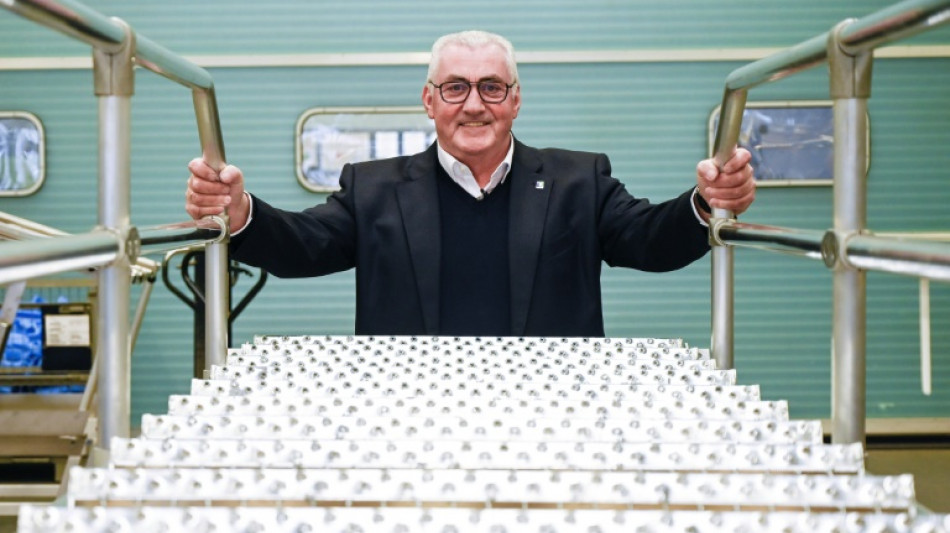
-
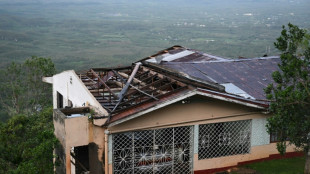 'Nowhere to sleep': Melissa upends life for Jamaicans
'Nowhere to sleep': Melissa upends life for Jamaicans
-
Irish octogenarian enjoys new lease on life making harps
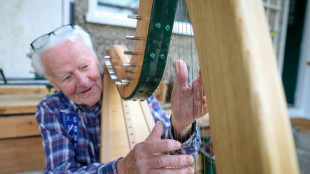
-
 Tanzania blackout after election chaos, deaths feared
Tanzania blackout after election chaos, deaths feared
-
G7 meets on countering China's critical mineral dominance
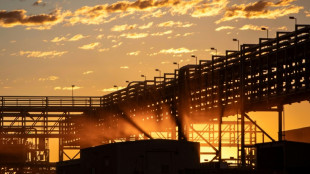
-
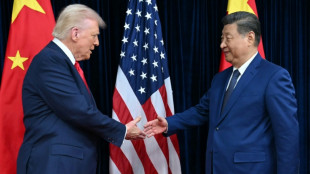 Trump hails tariff, rare earth deal with Xi
Trump hails tariff, rare earth deal with Xi
-
Court rules against K-pop group NewJeans in label dispute

-
 India's Iyer says 'getting better by the day' after lacerated spleen
India's Iyer says 'getting better by the day' after lacerated spleen
-
Yesavage fairytale carries Blue Jays to World Series brink

-
 Bank of Japan keeps interest rates unchanged
Bank of Japan keeps interest rates unchanged
-
Impoverished Filipinos forge a life among the tombstones

-
 Jokic posts fourth straight triple-double as Nuggets rout Pelicans
Jokic posts fourth straight triple-double as Nuggets rout Pelicans
-
UN calls for end to Sudan siege after mass hospital killings

-
 Teenage Australian cricketer dies after being hit by ball
Teenage Australian cricketer dies after being hit by ball
-
As Russia advances on Kupiansk, Ukrainians fear second occupation

-
 Trade truce in balance as Trump meets 'tough negotiator' Xi
Trade truce in balance as Trump meets 'tough negotiator' Xi
-
China to send youngest astronaut, mice on space mission this week

-
 Yesavage gem carries Blue Jays to brink of World Series as Dodgers downed
Yesavage gem carries Blue Jays to brink of World Series as Dodgers downed
-
With inflation under control, ECB to hold rates steady again

-
 Asia stocks muted with all eyes on Trump-Xi meeting
Asia stocks muted with all eyes on Trump-Xi meeting
-
Personal tipping points: Four people share their climate journeys

-
 Moto3 rider Dettwiler 'no longer critical' after crash: family
Moto3 rider Dettwiler 'no longer critical' after crash: family
-
US economy in the dark as government shutdown cuts off crucial data

-
 Trump orders nuclear testing resumption ahead of Xi talks
Trump orders nuclear testing resumption ahead of Xi talks
-
'Utter madness': NZ farmers agree dairy sale to French group

-
 Samsung posts 32% profit rise on-year in third quarter
Samsung posts 32% profit rise on-year in third quarter
-
30 years after cliffhanger vote, Quebec separatists voice hope for independence

-
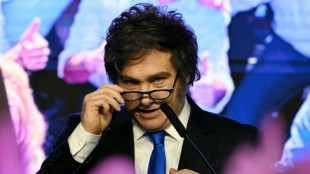 Taxes, labor laws, pensions: what Milei wants to do next
Taxes, labor laws, pensions: what Milei wants to do next
-
South Sudan's blind football team dreams of Paralympic glory
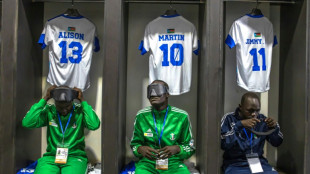
-
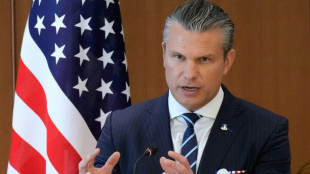 US says 4 killed in new strike on alleged Pacific drug boat
US says 4 killed in new strike on alleged Pacific drug boat
-
What we do and don't know about Rio's deadly police raid
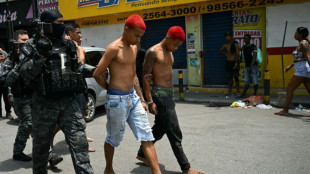
-
 'They slit my son's throat' says mother of teen killed in Rio police raid
'They slit my son's throat' says mother of teen killed in Rio police raid
-
Arteta hails 'special' Dowman after 15-year-old makes historic Arsenal start

-
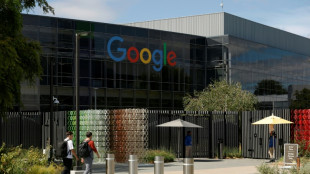 Google parent Alphabet posts first $100 bn quarter as AI fuels growth
Google parent Alphabet posts first $100 bn quarter as AI fuels growth
-
Underwater 'human habitat' aims to allow researchers to make weeklong dives
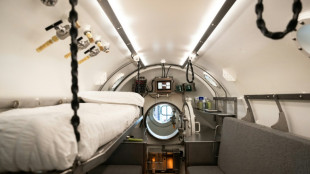
-
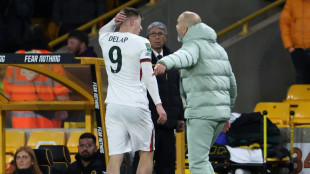 Maresca slams Delap for 'stupid' red card in Chelsea win at Wolves
Maresca slams Delap for 'stupid' red card in Chelsea win at Wolves
-
'Non-interventionist' Trump flexes muscles in Latin America

-
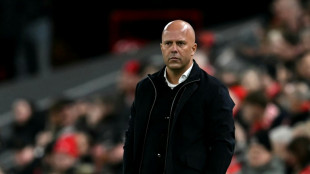 Slot defends League Cup selection despite not meeting 'Liverpool standards'
Slot defends League Cup selection despite not meeting 'Liverpool standards'
-
'Poor' PSG retain Ligue 1 lead despite stalemate and Doue injury
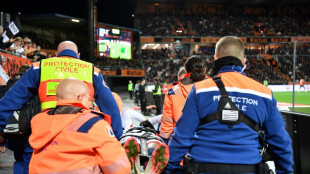
-
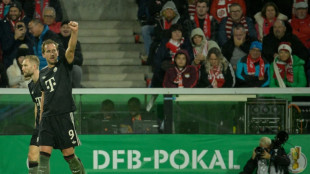 Kane nets twice in German Cup as Bayern set European wins record
Kane nets twice in German Cup as Bayern set European wins record
-
Liverpool crisis mounts after League Cup exit against Palace

-
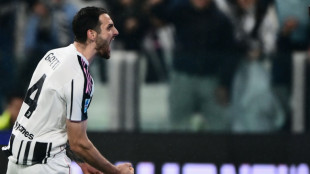 Juve bounce back after Tudor sacking as Roma, Inter keep pace with leaders Napoli
Juve bounce back after Tudor sacking as Roma, Inter keep pace with leaders Napoli
-
Kane scores twice as Bayern set European wins record
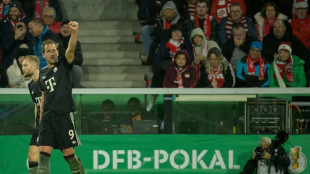
-
 Radio Free Asia suspends operations after Trump cuts and shutdown
Radio Free Asia suspends operations after Trump cuts and shutdown
-
Meta shares sink as $16 bn US tax charge tanks profit
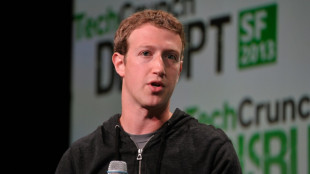
-
 Dollar rises after Fed chair says December rate cut not a given
Dollar rises after Fed chair says December rate cut not a given
-
Google parent Alphabet posts first $100 bn quarter as AI drives growth

-
 Rob Jetten: ex-athlete setting the pace in Dutch politics
Rob Jetten: ex-athlete setting the pace in Dutch politics
-
Juve bounce back after Tudor sacking as Roma keep pace with leaders Napoli

-
 Favorite Sovereignty scratched from Breeders' Cup Classic after fever
Favorite Sovereignty scratched from Breeders' Cup Classic after fever
-
Doue injured as PSG held at Lorient in Ligue 1


German industry seeks ladder out of supply chain woes
A new warehouse with a freshly unboxed smell is the consequence of the coronavirus pandemic for the German ladder, stool and scaffold-maker Munk.
In the southern town of Guenzburg on the banks of the Danube, the group has invested 10 million euros ($11.3 million) into the complex to stockpile enough raw materials and components to keep production running amid serious disruption to supply.
"I have not experienced anything like it in my 40 years," CEO Ferdinand Munk said of the shortages that hampered the country's comeback from the economic impact of the pandemic over the past year.
On Friday, the federal statistics agency Destatis will publish German growth figures for the fourth quarter, with early signs indicating Europe's largest economy shrank by "between 0.5 and one percent," curtailed by supply chain woes.
The last three months of the year were marked by the same bottlenecks and coronavirus restrictions which saw Germany limp to 2.7 percent growth in 2021, according to Destatis.
At Munk, the company has had difficulties sourcing rubber feet for ladders and aluminium, the production of which was troubled by a short supply of magnesium from China.
If the company were not holding double its normal stock of aluminium, "then we would no longer be able to produce because delivery times are now extremely long", Munk told AFP.
- Chained together -
After a crisis meeting with the company's biggest suppliers near the start of the pandemic, the Bavarian company now has "much shorter supply chains", said Munk, who sees an advantage in having suppliers that are closer to home.
The newly minted hangar is part of the company's plan to "come out of the pandemic strong and less dependent" on others, Munk said, as is his intention never to rely on just one supplier.
The ladder-maker will not be the only manufacturer making changes to their supply chains to manage deliveries and avoid disruption, said Fritzi Koehler-Geib, chief economist at the public lender KfW.
While pre-pandemic globalisation had fueled the trend of sourcing further afield in order to cut costs, the health emergency has led businesses to relook at their model of reliance on foreign suppliers.
Businesses will reevaluate "the balance between speed and cost efficiency in their supply chains and their resistance to shocks" after the pandemic, she said.
The dependence of Germany's large manufacturing sector on supplies of raw materials and components meant bottlenecks were particularly relevant for the progress of the economy, Koehler-Geib said.
The country's flagship carmakers were hit hard by an acute shortage of semi-conductors, a key component in the computer systems integrated into conventional and electric vehicles.
New car sales in Germany fell by 10.1 percent in 2021, according to industry figures, after collapsing 19 percent in 2020.
- 'Get us again' -
Semiconductor shortages are "very clearly the biggest difficulty," Robert Schullan, CEO of Hawe Hydraulik in Munich, told AFP.
Better supply of the chips, which Hawe builds into the controls for construction machinery and other products, is still "not in sight", he said.
The hydraulics group is managing the turbulent supply situation with a reinforced buying team, but the disruptions have held some work back.
Not just the manufacturer's suppliers, but its "clients are naturally also affected by bottlenecks", Schullan said, adding that Hawe was "well occupied" but could always do more.
Alarmed by how one of its pillars of industry has been crippled by the supply issue, the German government has pledged to plough billions of euros into bringing semiconductor production back to Europe.
But its impact will not be immediate.
Supply troubles look set to dampen Germany's economic recovery in the new year, with the government revising down its estimate for growth in 2022 on Wednesday to 3.6 percent from the 4.1 percent figure it forecast in October last year.
The revival is expected to pick up pace as the year goes on, but the start of the year would "still be subdued due to the coronavirus pandemic", the economy ministry said in a report.
Severe supply troubles will continue "into the fourth quarter" when the pandemic will have ebbed, Munk believes.
But he warned against complacency in the face of new risks, adding that bottlenecks could "get us again."
K.AbuTaha--SF-PST
